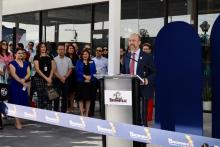Fiber Acquisitions and the New BEAD Numbers Are In | Episode 120 of the Connect This! Show

Catch the latest episode of the Connect This! Show, with co-hosts Christopher Mitchell (ILSR) and Travis Carter joined by regular guests Kim McKinley (TAK Broadband) and Doug Dawson (CCG Consulting) to talk about all the recent broadband news that's fit to print. Topics include:
- Starship launch success
- T-mobile buys USI Fiber in Minneapolis
- New BEAD numbers show a shifting of public dollars away from fiber and towards satellite
- AT&T buys Echostar spectrum; the 4th carrier is dead
- It's ISPs versus the music industry, with your privacy and connection on the chopping block
Join us live on September 5th at 2pm ET, or listen afterwards wherever you get your podcasts.
Email us at [email protected] with feedback and ideas for the show.
Subscribe to the show using this feed or find it on the Connect This! page, and watch on LinkedIn, on YouTube Live, on Facebook live, or below.










